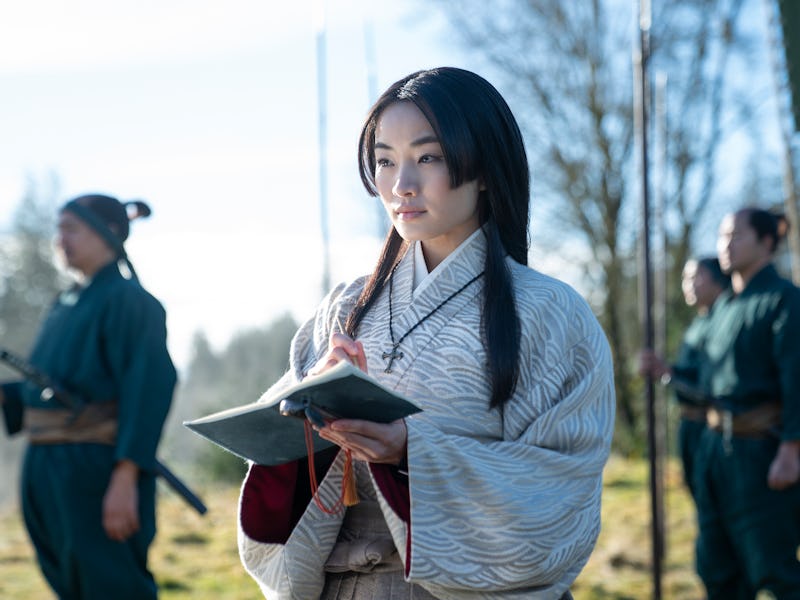Shogun is Setting New Standards for Culturally Authentic Storytelling
FX's epic miniseries isn't didactic, and that's one of the best things about it.

In the fourth episode of FX's Shogun, titled "The Eightfold Fence," John Blackthorne (Cosmo Jarvis) moves into his new home in Ajiro, begins instructing Kashigi Yabushige (Tadanobu Asano) and his men on how to fire cannons like English sailors do, and bonds further with his translator, Toda Mariko (Anna Sawai). The episode, in other words, focuses mostly on Shogun's most dangerous and familiar narrative elements. With Hiroyuki Sanada's Lord Yoshii Toranaga absent for the majority of it, there's little to stop the series from devolving into its worst and most clichéd self, too.
And yet Shogun never does. The miniseries moves Blackthorne's story forward throughout its latest episode without ever allowing his romantic relationship with Mariko or his increasingly comfortable position within Toranaga's army to turn it into a one-note, all-too-familiar story. Despite what its premise may suggest, Shogun is not a show about a white guy who seamlessly assimilates into a foreign culture and convinces everyone of the brilliance of his Western thinking along the way.
As it has now proved across its first four installments, the series simply has far too much respect for its characters to ever become that.
Every time it looks like Shogun is going to make a mistake, it doesn’t.
Before it reaches its bloody, explosive climax, "The Eightfold Fence" spends most of its runtime following Jarvis' Blackthorne as he moves into his own estate on Toranaga's orders and starts to earn the respect of not only Mariko but also her close friend and his consort, Usami Fuji (Moeka Hoshi). While he starts trying to show real respect to those around him, though, there are still constant cultural clashes between Blackthorne and everyone else in Ajiro. He remains tied to his distinctly Western notions of personal freedom, even though he has very little in the Asian country that he initially sought out hoping to sack and conquer.
Blackthorne's default level of brutishness is justifiably presented in a comedic light — and Jarvis continues to turn in one of the quietly funniest TV performances of the year. However, the brilliance of Shogun ultimately lies in how it presents the cultural clashes at the center of it. The show isn't afraid to make fun of Blackthorne, nor does it shy away from the insidiousness of his colonialist goals, but it also doesn't disparage every facet of his Western culture. In the episode's most romantic scene, he tells Mariko what his ideal day in London would be, and it sounds so genuinely pleasant that even she's delighted by it.
At the same time, Shogun boasts immense respect for both its Japanese characters and their culture. The show brings the customs of its feudal Japanese setting to life with as much detail and authenticity as it can, and it does so without ever making any grand statements about the potential value of one culture over another. When Mariko, for example, describes how "the eightfold fence" is an imaginary border that Japanese children are taught to build within themselves and retreat behind to be with their emotions, Shogun doesn't endorse or criticize that behavior. It simply presents it as a fact of Mariko's life that sheds further light on how she and the show's other Japanese characters behave.
Even when Hiroyuki Sanada isn’t around to ground the series, Shogun still manages to find a compelling way forward.
Shogun is a lot of things. It's epic, period-accurate, and thrilling, but one thing it isn't is didactic. The series has little interest in stating its thematic intentions out loud or telling viewers how they're supposed to feel. It presents the events and details of its story in as straightforward a manner as possible. In doing so, it not only proves just how much confidence it has in the inherent drama of its story, but it also allows itself a chance to achieve a level of immersion that is frequently astonishing to experience.
In addition to being a miniseries about a feudal Japanese lord fighting to stay alive and secure his position, it is also a show about a British sailor who is reluctantly forced to accept his new life in Japan. Slowly but surely, Blackthorne is being pushed through his time with Mariko and co. to let go of the material and cultural artifacts he's obsessed with holding onto. Whether or not he ever fully will remains to be seen, but it's a testament to how skillfully Shogun is navigating its way through its plot that the series has so far told such a story without ever making the same kind of weightless, blatantly moralistic statements that have dragged down so many shows and films like it in the past.